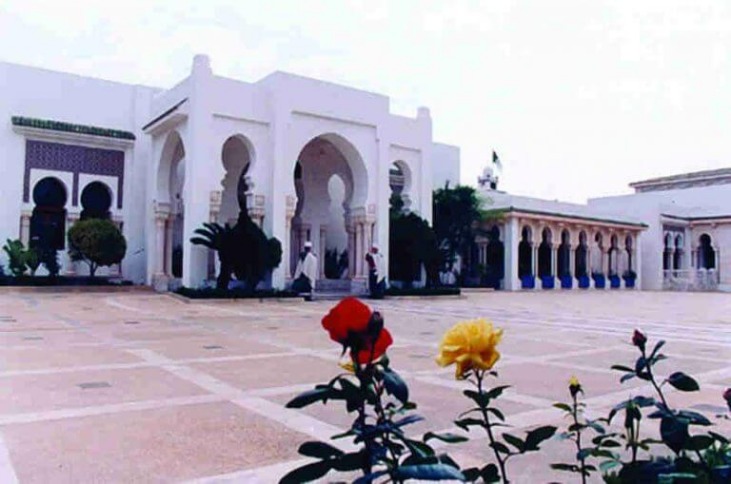Historical Context of Colonization in Algeria
The colonization of Algeria began in the early 19th century, when France expanded its empire across Africa and the Mediterranean. This process intensified after France formally invaded in 1830, leading to a prolonged struggle for control over the territory. The colonization period was marked by significant political, social, and economic changes, as well as widespread resistance from the native Algerian population. Understanding this historical context is essential to grasp the lasting impacts of colonial rule on Algeria’s development and identity.
Pre-Colonial Societies and Indigenous Kingdoms
The historical context of colonization in Algeria is deeply rooted in its rich pre-colonial history, marked by diverse societies and powerful indigenous kingdoms. Before European intervention, the region was inhabited by various Berber tribes with distinct social structures and cultural practices. These communities often formed independent local kingdoms, such as the Kingdom of Aures and the Berber dynasties that ruled parts of the Maghreb. The Idrisid and Zirid dynasties, for example, played significant roles in establishing political stability and cultural development in parts of what is now Algeria. These societies maintained their traditions and governance systems, fostering a sense of local identity and independence. However, the arrival of the Arab conquests in the 7th and 8th centuries introduced new cultural influences, leading to the Arabization of many indigenous groups and the integration of Islam into local societies. Over time, the region became a crossroads of various civilizations, including Phoenicians, Romans, and Byzantines, each leaving their mark before the arrival of the Arab tribes. This complex history of indigenous kingdoms and societies created a diverse cultural fabric that was significantly altered by subsequent colonization efforts during the 19th century under French rule, which aimed to reshape the social, political, and economic landscape of Algeria.”
European Exploration and Early Contact
The historical context of colonization in Algeria is rooted in European exploration and early contact that began in the 15th and 16th centuries. Portuguese and Spanish explorers initially navigated the Mediterranean, establishing trade routes and gaining knowledge of the region’s coastal areas. As European powers expanded their maritime and imperial ambitions, France began to show increased interest in North Africa during the early 19th century. This interest was driven by strategic, economic, and political motives, including controlling Mediterranean access and acquiring valuable resources. Early contacts with Algerian coastal communities were primarily driven by trade and military engagement, setting the stage for France’s gradual occupation of the territory. These interactions marked the beginning of a long and complex process of colonization that would profoundly influence Algerian society, culture, and history for centuries to come.
Ottoman Influence and Governance in Algeria
The historical context of colonization in Algeria is deeply rooted in its diverse past, marked by periods of foreign influence and complex governance. Before becoming a French colony, Algeria was part of the Ottoman Empire for several centuries, beginning in the 16th century. During this period, Ottoman influence shaped the political, military, and social structures of the region. The Ottomans established a loose governance system with local Berber and Arab leaders, known as Beys, who governed various regions under the overall authority of the Ottoman administration based in Algiers. This period was characterized by a decentralized form of rule, with local leaders exercising substantial autonomy, while the Ottoman Empire maintained nominal sovereignty.
Ottoman governance in Algeria was marked by the establishment of a Regency of Algiers, which became an important Atlantic port and a center for commerce and piracy. The Ottoman authorities relied heavily on local military and administrative elites to maintain control, often allowing significant local autonomy but also intervening in regional affairs when necessary. Over time, the Ottomans faced challenges from European powers, internal conflicts, and local resistance, which gradually weakened their grip on Algeria. This era laid the groundwork for subsequent European colonization, as the region experienced shifts in power, economic dependencies, and social dynamics, setting the stage for the later French colonization in the 19th century.
European Conquest and Establishment of Colonial Rule
The colonization of Algeria by European powers marked a significant chapter in the history of colonial expansion. Initiated in the early 19th century, European nations, particularly France, sought to establish control over North Africa due to strategic, economic, and political interests. This process involved military conquest, the establishment of administrative structures, and efforts to assimilate the local population into European cultural and political systems. The colonization of Algeria profoundly transformed its social fabric, economy, and landscape, leaving a lasting legacy that continues to influence the region today.
French Invasion of Algiers in 1830
The French invasion of Algiers in 1830 marked a significant turning point in the European conquest and establishment of colonial rule in Algeria. This event signified France’s strategic ambition to expand its empire into North Africa, driven by economic interests, national prestige, and a desire to challenge British and Ottoman influence in the region. The invasion initiated a prolonged and often brutal process of colonization that profoundly altered Algeria’s social, political, and economic landscape.
- The invasion began with a naval assault on Algiers in June 1830, under the pretext of restoring order after a dispute with the Bey of Algiers.
- Following successful military operations, France established a colonial presence, gradually consolidating control over the territory through a series of military campaigns against local resistance.
- colonization policies aimed at displacing indigenous populations, seizing land, and establishing French settlements, which led to widespread displacement and social upheaval.
- The colonization was supported by economic exploitation, focusing on agriculture, resource extraction, and infrastructure development to benefit France’s imperial interests.
- Resistance movements emerged among Algerian natives, leading to prolonged conflicts such as the Algerian War of Independence, which lasted from 1954 to 1962 and ultimately resulted in Algeria gaining independence from France.
Ultimately, the French invasion of Algiers and subsequent colonization exemplify the broader European pattern of conquest and imperial control during the 19th century, which had lasting impacts on Algeria’s territorial integrity and national identity.
Military Campaigns and Conquest Strategies
The colonization of Algeria by European powers, primarily France, was marked by a series of strategic military campaigns and complex conquest strategies aimed at establishing control over the territory. The process began in 1830 when France launched a military invasion, initially portraying it as a maritime security measure but quickly evolving into a full-scale colonization effort. French military forces employed both conventional warfare and disruptive tactics to subdue local resistance, including the use of artillery, scorched earth policies, and brutal suppression of uprisings. The conquest strategy combined military might with political diplomacy, often exploiting internal divisions among Algerian tribes and leaderless groups to weaken opposition. France’s goal was to suppress resistance and establish a settler colony, which involved the displacement of local populations and the establishment of a new colonial administration. The military campaigns of the period were characterized by their intensity and cruelty, exemplified by battles such as the Battle of the Isly and extensive campaigns in Kabylie. Over time, France solidified its control, developing a system of military garrisons, forts, and infrastructure to maintain dominance. The conquest of Algeria thus reflected a broader European colonial strategy that merged military conquest with economic exploitation and cultural assimilation, setting the stage for decades of French rule and significant social and political upheaval in the region.
Establishment of French Colonial Administration
The European conquest and establishment of colonial rule in Algeria marked a significant chapter in the history of French imperialism. During the 19th century, France rapidly expanded its influence in North Africa, culminating in the invasion of Algeria in 1830. Military campaigns led by French forces subdued local resistance and paved the way for the establishment of a robust colonial administration. The French aimed to integrate Algeria into their empire, transforming it into a settler colony with a focus on economic exploitation and political control. The colonial administration was characterized by the implementation of direct rule, land confiscations, and efforts to reshape Algerian society and economy according to French interests. This process laid the foundation for a complex colonial system that would influence Algerian society for decades, leading to social upheavals and eventually inspiring independence movements in the 20th century.
Socioeconomic Impact of Colonization
The colonization of Algeria by European powers, particularly France, had profound and lasting socioeconomic effects on the country. This period of colonization transformed Algeria’s economic landscape, social structures, and cultural identity, often disrupting indigenous systems and introducing new dynamics that would shape its development long after independence. Understanding the socioeconomic impact of colonization provides insight into the complex legacy that continues to influence Algeria today.
Land Acquisition and Use Changes
The colonization of Algeria, primarily by France from 1830 to 1962, had profound socioeconomic impacts that reshaped the country’s land structure and use patterns. During this period, extensive land acquisition policies were implemented, leading to significant changes in land ownership, agricultural practices, and economic activities. These transformations disrupted traditional social hierarchies and farming systems, creating long-lasting effects on Algerian society.
- Land confiscation from indigenous Algerian farmers to establish colonial settlement and plantations, reducing native landholdings and altering rural landscapes.
- Introduction of European-style farming methods and crop preferences, which often displaced traditional land use and affected local ecosystems.
- Concentration of land ownership in the hands of colonial settlers and corporations, leading to increased economic disparity and marginalization of local farmers.
- Development of infrastructure such as roads, railways, and ports aimed at facilitating resource extraction and export, which often prioritized colonial economic interests over local needs.
- Displacement of indigenous populations from fertile lands, resulting in social dislocation and loss of livelihoods for many Algerians.
- Economic shift toward resource extraction and export-oriented agriculture, reducing self-sufficiency and fostering dependence on colonial markets.
Overall, colonization drastically transformed Algeria’s land use and economy, with lasting socioeconomic consequences that contributed to the underlying tensions leading to independence movements and continuing development challenges today.
Economic Exploitation and Resource Extraction
The colonization of Algeria by France had profound socioeconomic impacts, primarily driven by economic exploitation and resource extraction. During the colonial period, Algerian resources such as agricultural products, minerals, and labor were extensively exploited to benefit the colonial power, often at the expense of local communities. This economic paradigm prioritized the needs of France, leading to the restructuring of Algerian economies to serve colonial interests rather than local development. Indigenous populations faced significant disadvantages, including land dispossession and limited access to economic opportunities, which perpetuated cycles of poverty and dependence. The extraction of resources not only depleted Algeria’s natural wealth but also fostered economic disparities that persisted long after independence. The colonial economy thus created an uneven social structure, with wealth concentrated in colonial settlers and the French economy, marginalizing native Algerians and hindering sustainable growth. Overall, colonization significantly shaped Algeria’s socioeconomic landscape, with enduring consequences for economic sovereignty and social equity.
Displacement and Demographic Shifts
The colonization of Algeria by European powers, primarily France, had profound socioeconomic impacts that continue to be felt today. One of the most significant consequences was the displacement of indigenous populations and the disruption of traditional social and economic structures. European settlers often displaced local communities from fertile lands, redirecting resources and agricultural production to benefit colonial interests. This led to a decline in local economic self-sufficiency and increased dependency on colonial imports and policies.
Demographic shifts were another notable aspect of colonization in Algeria. The influx of European settlers, known as pieds-noirs, altered the demographic composition of the country. Indigenous Algerians faced marginalization, losing access to land, education, and economic opportunities. These demographic changes fostered social divisions and tensions, laying the groundwork for long-term conflicts. The displacement and demographic shifts contributed to ongoing issues of inequality, cultural erosion, and economic disparity that persisted even after independence.
Resistance and Rebellion Movements
Resistance and rebellion movements have played a crucial role in shaping the history of nations under colonial rule. In the context of Algerian colonization, these movements emerged as powerful expressions of the people’s desire for independence and sovereignty. Through various forms of resistance, from peaceful protests to armed uprising, Algerians fought to reclaim their land, culture, and identity, ultimately leading to a significant struggle for liberation from French colonial dominance.
Early Uprisings and Local Resistance
During the period of colonization in Algeria, resistance and rebellion movements emerged as a powerful response to foreign domination. Early uprisings often reflected the local population’s desire to preserve their cultural identity and oppose the oppressive colonial policies implemented by French authorities. These movements ranged from spontaneous acts of defiance to organized efforts aimed at national liberation, demonstrating the resilience and determination of Algerian villagers, tribes, and communities. Local resistance was characterized by guerrilla tactics, clandestine meetings, and the preservation of traditional customs, all serving as forms of protest against the colonizers’ attempts to erode Algerian heritage. These early struggles laid the groundwork for larger independence movements that would eventually challenge colonial rule with broader nationalistic aspirations.
The Algerian War of Independence (1954–1962)
The Algerian War of Independence (1954–1962) was a pivotal resistance movement against French colonization and domination in Algeria. It marked a fierce struggle by Algerians to gain independence from nearly 132 years of French rule, which began with colonization efforts in 1830. The conflict was characterized by guerrilla warfare, political activism, and widespread civil resistance, as Algerians sought to reclaim their sovereignty and cultural identity.
The National Liberation Front (FLN) emerged as the principal organization leading the rebellion, orchestrating attacks, mobilizing support, and negotiating on behalf of the Algerian people. The war was marked by brutal violence, including massacres, torture, and the use of police and military force by the French government to suppress the uprising. Despite the intense repression, the resistance gained international attention and increased global pressure on France.
This movement significantly impacted the decolonization process and challenged the durability of colonial rule in Africa and beyond. Ultimately, pressure from both internal resistance and international diplomacy led France to negotiate independence for Algeria, culminating in the Évian Accords and formal independence in 1962. The Algerian War of Independence remains a profound example of colonized peoples resisting through rebellion, shaping the course of history in North Africa and inspiring subsequent struggles for freedom worldwide.
Key Figures and Acts of Resistance
During the period of colonization in Algeria, numerous resistance and rebellion movements emerged as a response to French colonial rule. These movements aimed to defend Algerian independence and assert national identity against oppressive policies. Key figures such as Emir Abdelkader, who led early resistance in the 19th century, and later modern leaders like Ahmed Ben Bella, played significant roles in mobilizing Algerians against colonization. Acts of resistance ranged from armed rebellions and guerrilla warfare to intellectual and cultural campaigns that sought to preserve Algerian heritage. The struggle intensified throughout the 20th century, culminating in the Algerian War of Independence (1954-1962), which was marked by widespread acts of sabotage, uprisings, and political activism. Notable acts of resistance included the formation of the National Liberation Front (FLN), which coordinated military operations and political efforts to challenge French authority. These movements and figures collectively contributed to the eventual decolonization of Algeria and the establishment of an independent nation.
Consequences of Colonization
The colonization of Algeria by European powers, primarily France, has had profound and lasting effects on the country’s social, political, and economic landscape. This period of colonization resulted in significant cultural shifts, exploitation of resources, and resistance movements that shaped Algeria’s journey towards independence. Understanding these consequences is essential to comprehending modern Algerian identity and its ongoing efforts to rectify historical injustices.
Political and Social Aftermath
The colonization of Algeria by France had profound political and social consequences that shaped the nation’s future. Politically, it led to the loss of sovereignty as Algeria was integrated into the French colonial system, suppressing indigenous governance and imposing French authority. This resulted in the marginalization of Algerian political entities and the denial of self-determination for decades. Socially, colonization disrupted traditional Algerian social structures, culture, and identity. French policies marginalized native customs and languages, fostering resentment and resistance among Algerians. The social divide widened, with Europeans enjoying privileged positions while Algerians faced discrimination and exploitation. The aftermath of colonization fueled a desire for independence, ultimately culminating in the Algerian War of 1954-1962 and the country’s subsequent emergence as an independent nation, but the scars of colonial oppression continued to influence its political and social landscape for years to come.
Cultural and Identity Suppression
The colonization of Algeria by France had far-reaching consequences, particularly in terms of cultural and identity suppression. The colonial authorities sought to diminish and replace indigenous traditions, languages, and social structures to establish French dominance. Algerian languages such as Arabic and Berber were marginalized, and French became the language of administration, education, and the elite, leading to a decline in the use of native languages among younger generations. Cultural practices and religious traditions were often suppressed or viewed as obstacles to modernization, disrupting the transmission of heritage and identity. This systematic erosion of cultural identity fueled resistance movements and contributed to a lasting sense of loss and alienation among Algerians. The legacy of this suppression continues to influence Algeria’s post-independence efforts to reclaim its cultural sovereignty and national identity.”
Path to Independence and Post-Colonial Transition
The colonization of Algeria by France had profound and lasting effects on the nation’s social, economic, and political landscape. It involved the exploitation of resources, suppression of local culture, and displacement of indigenous populations, which fostered deep-seated resentment and resistance. This period of colonization also led to significant inequalities and social fragmentation, laying the groundwork for ongoing conflicts. The struggle for independence became a defining chapter in Algeria’s history, marked by a brutal war that lasted from 1954 to 1962, culminating in Algeria’s liberation and the establishment of its sovereignty. The path to independence was fraught with violence and sacrifices, but it ultimately symbolized a rejection of colonial domination and the assertion of national identity.
Following independence, Algeria faced the challenge of transitioning from a colonial economy heavily reliant on France, to establishing its own economic and political institutions. The post-colonial transition involved efforts to rebuild infrastructure, promote national unity, and address social injustices inherited from the colonial era. Land reform, economic diversification, and the development of education systems were key priorities, but the nation also grappled with internal conflicts and struggles over governance. The process of decolonization not only transformed Algeria’s political status but also had enduring impacts on its societal cohesion and development trajectories.





0 Comments